- Home
- Nancy Pickard
Say No to Murder Page 20
Say No to Murder Read online
Page 20
Through the rain, I watched him stand beside the pound. He seemed to be looking into his depths. Did he see faces floating before him in his imagination? Did he see the wife he took to lover’s leap? Did he see the old lobsterman who would not have been able to identify the murderer until he saw the photograph in the paper that week of the newly elected president of the board of realtors? Then a phone call. An arranged meeting at the old house. A walk to the bedroom to show the realtor how the blackmailer knew what he knew. A demand for money. And then another burst of violence, another human being pushed over an edge, and down . . . into the pound with the lobsters. And then the killer going around the old house, breaking windows, making it look as if vandals had been at work so no one would question a single broken window.
Then early the next morning, donning the old man’s slicker, taking the old man’s boat out to the traps, making sure of being seen at first, then gaffing the pot to set the stage, then escaping unseen through the rough water in a powered dinghy, perhaps even the one from the Amy Denise. And leaving it to the Coast Guard to come to the logical, but wrong, conclusion.
He stood in the rain, staring at the pound.
I crouched in the rain, staring at him, waiting.
Ted . . . identifying Ansen Reich from my fateful description. Tampering with his brakes, meaning only to frighten him, probably intending to follow it up with a warning phone call, but killing him instead . . . so that Reich could not implement his threats to impede the orderly progress of Liberty Harbor where Ted’s bodies were buried.
Ted . . . who didn’t want the police looking into the reasons why someone might want the harbor to proceed . . . committing harmless acts of arson and vandalism to make his inadvertent murder of Ansen Reich look like part of a scheme of sabotage. But only someone closely connected with the renovation would have known just where to aim his “sabotage” to do the least damage, cause minimum delay.
Ted . . . playing into Hardy’s hand, as well, by making the obscene phone calls that implied racist motives, and by using the cross from the Unmarked Grave to commit his next murder.
Ted . . . leading the committee to think on Sunday that Atheneum McGee had agreed to leave us in peace, then stabbing to death the second man who had threatened the realtor’s safety and freedom. How surprised Ted would be to discover the link between Ansen and Atheneum, a link that had fascinated the police, but about which the murderer knew nothing.
And Ted . . . the only member of the committee besides Jack Fenton who knew where the Amy Denise was anchored and how I was getting back and forth to it. Of course he knew: it was his boat, and he’d asked me to keep him informed of its whereabouts. It was that realization that had come to me as I struggled to survive his attempt on my life the night before.
I could barely see him. There was no way he could see me.
But then a flash of lightning illuminated him.
I stood up.
chapter
35
When he saw me, his lip moved, but I didn’t wait to hear what he had to say. I leaped onto the porch, as if to confront him.
Suddenly he was dashing toward me in his bare feet. Along the opposite side of the pound he came, around the corner, and now along the side where I was backing away from him through piles of trash and old tools that Lobster had deposited there years before.
This was happening faster than we’d—I’d—anticipated. The desperation and violence of the man were quickly triggered. Instantly, I knew we’d calculated wrong, and the sum of this equation might be my death. Ted could have his hands on me in the fatal few seconds before Geof and Ailey could race from the upstairs bedroom.
He was within feet of me, his mild face twisted into something evil.
One of the tools at my feet was the rusty pitchfork that Lobster—and then the Towers—used to feed fish parts to the soft shedders in the pound. I grabbed it, then stabbed the yard of air that stood between me and the man who’d already killed four people and tried to kill me.
It stopped him in midstride.
He stooped to pick up something I couldn’t see, and hurled it at me. Suddenly, I had something foul and slimy in my face. Blindly, I let go of the pitchfork with one hand and wiped frantically at whatever it was that was dripping down me. It was fish parts that he had scooped from a bucket by the pound.
In that moment when I was off balance, Ted flew at me, arms outstretched, oblivious to my weapon. I grabbed it with both hands again and raised it to ward him off, but the slime from the fish parts made my hands and the pitchfork slippery and I couldn’t get a purchase on it.
His hands were inches from my face when I dropped the pitchfork and took my only means of escape; once again, into the water, only this time it was the horrible old lobster pound foil of filth and shedders.
Ted grabbed the weapon I had dropped and began to stab wildly at me as I struggled in the water. Another flash of lightning illuminated his murderous intent. One prong of the fork sliced at my shoulder and I screamed, letting in a mouthful of putrid, salty water. With that arm numb and disabled, I kicked my feet violently and plunged my other arm up and down, trying to escape that tormenting pitchfork. In the last burst of lightning, I’d finally seen figures at the window of Lobster’s bedroom, figures that Ted, with his back turned to them, did not see. Hurry, my mind screamed to those figures in the window. Could they even see what was happening down here in the rain and blackness?
My hair had wrapped around my face, blinding me. Desperately I reached out with both hands in front of me, ignoring the searing pain in the wounded shoulder. One hand touched something smooth and firm.
Ted took final aim at my face. I hauled my good arm out of the water and hurled the only weapon I had. I heard a grunt of surprise from Ted and then a scream of pain and the pitchfork fell harmlessly in the water behind me.
“Get off me!” he screamed as bulky figures appeared to grab him. But it wasn’t the police that Ted wanted removed from his person: It was the lobster I had thrown, at him and which was now clamped furiously to the hand he’d thrown up to protect himself.
I grabbed the pitchfork and held it out to Ailey Mason so he could grab it and pull me in. Dragging my torn shoulder, I clambered up the side of the pound until I was lying, then kneeling and finally standing on solid ground. Geof’s face appeared out of the darkness and he opened his arms to me.
Then he got a whiff of me. And changed his mind.
In the patrol car on the way to the hospital, they made me sit in the back seat and they rolled all the windows down, despite the rain. At the hospital, a nurse, a doctor and two orderlies came running up, only to back off quickly. “You can have this one,” said one doctor to the another. “Oh no,” said the second doctor, “it’s all yours.” Finally, they washed out, disinfected and stitched the wound, which was more painful than serious, and then they escorted me to a hospital shower. A nurse’s aide handed me a huge, fresh bar of deodorant soap. “Take your time,” she said sweetly.
It was difficult to scrub with one wounded wing.
“Don’t worry about it,” Geof said when he picked me up at the emergency room exit an hour later. “We’ll work on it when we get home.”
He drove me to the Ramada Inn. We parked in front of Room 106, got out and knocked at the door.
“Jennifer!” my father exclaimed when he opened the door. He was dapper in a mauve smoking-jacket and matching slacks. For once, he looked me straight in the eye. “My dear, I do apologize. A young lad rowed out to the boat yesterday evening and said you had paid him to come tell me to meet you back at the marina. Well, I hauled anchor and sailed off immediately! When you failed to appear, I grew quite concerned, my dear.”
I saw tears glistening in the gray eyes.
“But,” he said cheerily, “this nice police detective found me today. He assured me you were all right, and it was all some kind of practical joke. Honestly, the things people find funny these days is simply beyond me.”
M
y father pulled me into the room with him, smiling an apology to Geof, who waited just behind me outside the door.
“My dear,” he said quietly, “I know he’s just a policeman, but he is a Bushfield, and I think he’s interested in you. If he asks you for a date, you might consider going. I wouldn’t mind, you know. In fact, a merging of the Cain and Bushfield interests might be an excellent idea.”
I peered around my father as if to inspect Geof. “Well,” I said doubtfully, “he is cute, but are you sure you want a cop in the family?”
“Jennifer,” said my father reprovingly, “don’t be a snob.”
Past midnight.
“Put down your wine and turn around.”
I placed the plastic glass in the corner of the bathtub and wheeled on my bottom so my back faced him, so to speak. Soon I felt a warm, soapy washcloth applied with the expertise of a masseur. He was delicate around the edges of the bandage. After a few moments of heaven, I sighed and leaned fully against his wet chest. Two pairs of knees rose like knobby islands in the water. Geof reached around me with a long arm to retrieve my glass of wine and hand it to me.
We were rehashing the day’s and night’s events, trying to ease the horror and sorrow out of our unconscious, where they might turn into nightmares, into the light of consciousness where we could try to understand and accept.
“Tell me again,” he demanded, “how you knew she had a trust fund.”
“It seemed logical,” I said. “Ted is the world’s worst real estate salesman, but even in his leanest years they lived well. Yet she didn’t work outside the home. And still, she was able to give him that boat as an anniversary present. When a woman can do that, the answer is often a trust fund.”
“I can’t stop thinking about how Ted really gave us the first clue when we were only kids,” Geof said, and I heard pain and regret in his voice. “He was going to retire at thirty-nine, he said, Jack Benny’s age. If I’d stopped to add and subtract, I could have figured out that he killed her when he was thirty-two, so that he could have her declared dead, inherit her estate and set sail as he always said he would. That year when he was thirty-two must have been the point of no return: either she would agree to his plans and finance them with her money, or he would kill her so he could do what he wanted to do all along.”
“Can you imagine sailing off into the sunset on a boat named after the wife you’d murdered?” I mused, and shivered against him, “You know, when you and I were trying to figure out what might have happened on lover’s leap two years ago, we never thought of Ted and Amy. But when I was in the mayor’s office day before yesterday, she seemed a little too sympathetic to his business woes. I thought they were having an affair.”
“Our mayor?” Geof rested his chin on top of my head and chuckled. “If she ever has an affair, it will be with the head of a Fortune 500 company or a United States senator.”
“A Republican senator.”
“Yes.” He chuckled again and kissed my left ear.
“Well, anyway,” I said, wanting to fill in a few blanks left from my revelations to Geof that afternoon in The Buoy, “I called her to ask why Ted had such a tough time two years back. And she reminded me that that was the year Amy disappeared. ‘Poor Ted,’ she said. He did a fine job of convincing the whole town that he was the loving, suffering husband whose wife had abandoned him for a lover. But he never named the lover. And it was always just Ms word for it, wasn’t it? He even told Pete Tower that he was suicidal over it, but then he made the mistake of giving Pete the complete name of a volunteer he had supposedly contacted at the suicide center.”
“So what?”
“So for their own protection, they never give their last names. Ted probably met somebody who worked there, and decided to throw in that little embellishment to prove Ms misery.”
Geof grunted, a sound that reverberated in my spine. “That’s typical, Jenny, of how criminals sometimes hang themselves by talking too much. Does them in, more often than not.”
I scrunched around so that I could lie on my good shoulder against him and look at his face. “Geof, you didn’t want to believe me, did you? In your heart, did you really believe it until you saw him lift that gate?”
“Yes,” he said, surprising me. “When I was up in Lobster’s bedroom, waiting to see what Ted would do when he realized you had witnessed that incriminating act, I saw something that cinched it for me. Do you remember a pile of newspapers in a comer of that room?”
“Yes.”
“Guess whose photograph was circled in bright red in the paper for February twelve?”
“Ted Sullivan, the newly elected president of the board of realtors.”
“And Lobster died on the thirteenth, so he must have called Ted immediately and set up the appointment for the next day. And Amy Denise must have died sometime earlier that week. You know,” he said then, “it’s a good long run from that second-floor bedroom to the pound. We were lucky to get there in time.”
“I was lucky,” I said humbly.
We soaked until the water cooled. Then we climbed out of the tub, dried each other off and padded into the bedroom. My shoulder was beginning to throb despite the wine, but I didn’t want to take a pain pill yet.
Geof reclined on his side of the bed, on top of the covers. I didn’t get in beside him right away, but sank onto the floor and lay my head near him on the edge of the mattress. He reached down to stroke my hair.
“You don’t have to get on your knees and beg, Jenny.”
I looked up to find him smiling. He bent his own face down to mine and kissed me. “At a certain moment tonight,” he said, “I will ask you one more time. And if you say no, I will roll over, turn on the light and read this month’s National Geographic.”
“That’s blackmail.” I laughed. “And you know where that got Lobster McGee.”
“I don’t want your money, honey. Just you.”
We kissed again. And again. And again. Somehow, I ended up on the bed beside him after all. At a later, appropriate moment, he stopped what he was doing to demand an answer.
“This,” I said, “is hardly the time to say no.”
We proceeded to merge the Cain and Bushfield interests.
The next day, when the lobster pound was fully drained, the workmen found stuck in the tunnel the remnants of a fat orange life preserver.
epilogue
“You see, Jennifer,” crowed Webster Helms. “There was nothing to worry about, nothing at all.”
“I wasn’t worried, Web.”
But he was right: the ribbon-cutting ceremony for the official grand opening of Liberty Harbor was going off perfectly. And he had a right to crow, as did Goose. Web’s designs had been translated by the builder into charming buildings. In the ship-building school, the young apprentices were sawing and sanding happily away. The three-story mall rose grandly above the bay, enticing everyone with its mix of shop and pubs. The old pier that Ansen Reich had plunged off was gone now, replaced by a sturdy new one where, already, a few old men and youngsters had cast their lines to see what they could catch.
Across the cleaned and sparkling lobster pound, the old house looked like an advertisement for a paint company. Tourists were lining up to inspect it—not, I suspected, so much for its historical value as a tribute to fishing, but for its titillation value as the site of infamous murders.
Rest easy, Lobster, I thought.
I walked across the new cobblestone path that was designed to look quaintly old, and succeeded, to congratulate the mayor on this great day for her city.
“Thank you, Jenny,” said her Honor, Mary Eberhardt. “It’s a joy to me, personally, to see so many faces of color among this crowd. I feel that Port Frederick is only beginning to rise, that we will set a standard of racial cooperation that will . . .”
“Oh my Lord,” moaned her husband. “I got me a politician for a wife.”
“It’s your own fault, Hardy,” Mary said tartly, then returned his fond smile. �
�You could have run for the job yourself, you know.”
“I have the Lord’s work to do,” he said firmly. “And He keeps me plenty busy.”
“Well,” I said, “we don’t any of us have anything to do for the moment. What would you say to my treating you to a congratulatory drink at the café?”
And so we strolled over to the little French café beside the lobster pound. C’EST LA VIE, said the sign above the door, announcing both the cafe’s name and its owner’s new philosophy.
We took seats on the open-air veranda, within sight of the Unmarked Grave that had eventually found a home beside Lobster McGee’s old house. It was, as the Eberhardts had promised, a simple, discreet, but somehow terribly moving memorial. We watched a steady stream of visitors approach it quietly, stand respectfully beside the fence for a few moments, then move on. An old black woman went down on one knee and prayed. Her grandchild tossed a home-gathered bouquet on the grave.
The proprietor of the café appeared at our table, menus in hand, and observed the scene with us.
“There,” said Barbara Schneider, “lies the former mayor of Port Frederick, Massachusetts.”
We broke up laughing, then ordered drinks.
Barbara, more relaxed than I’d ever seen her, personally returned with them, then sat down at the table with us. Over her shoulder I saw a poster that advised her patrons to “Vote Republican Next Time.”
“Congratulations, Madam Mayor,” she said to Mary.
“Congratulations, Madam Mayor,” Mary said to her.
“Why aren’t you married yet, Jenny?” Barbara asked bluntly.
“Well,” I said, “you know, one thing and another.”

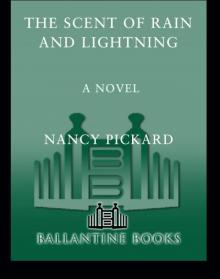 The Scent of Rain and Lightning
The Scent of Rain and Lightning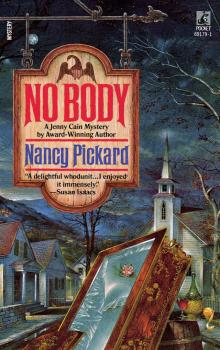 No Body
No Body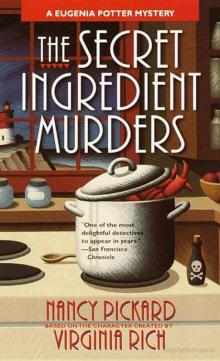 The Secret Ingredient Murders: A Eugenia Potter Mystery
The Secret Ingredient Murders: A Eugenia Potter Mystery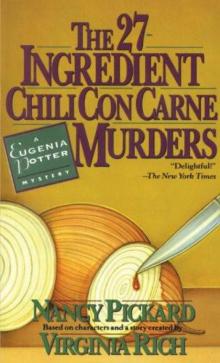 The 27-Ingredient Chili Con Carne Murders: A Eugenia Potter Mystery
The 27-Ingredient Chili Con Carne Murders: A Eugenia Potter Mystery Twilight
Twilight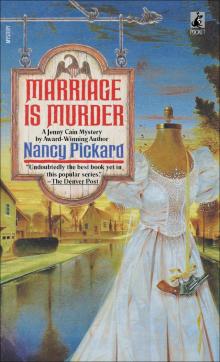 Marriage Is Murder
Marriage Is Murder I.O.U
I.O.U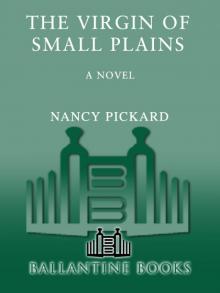 The Virgin of Small Plains
The Virgin of Small Plains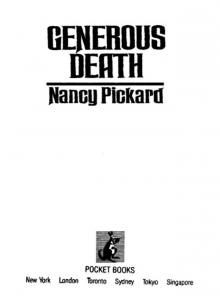 Generous Death
Generous Death The Whole Truth
The Whole Truth The Blue Corn Murders
The Blue Corn Murders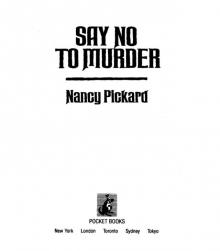 Say No to Murder
Say No to Murder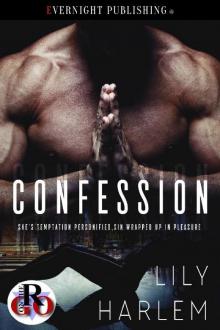 Confession
Confession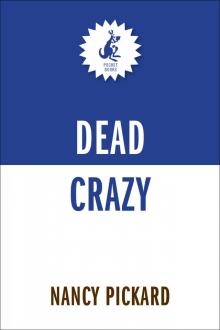 Dead Crazy
Dead Crazy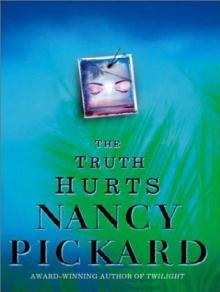 The Truth Hurts
The Truth Hurts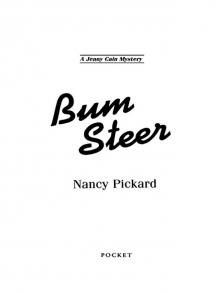 Bum Steer
Bum Steer